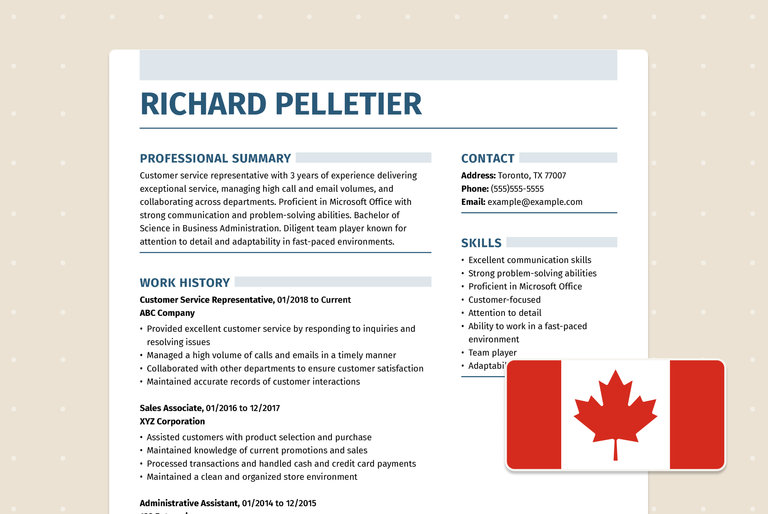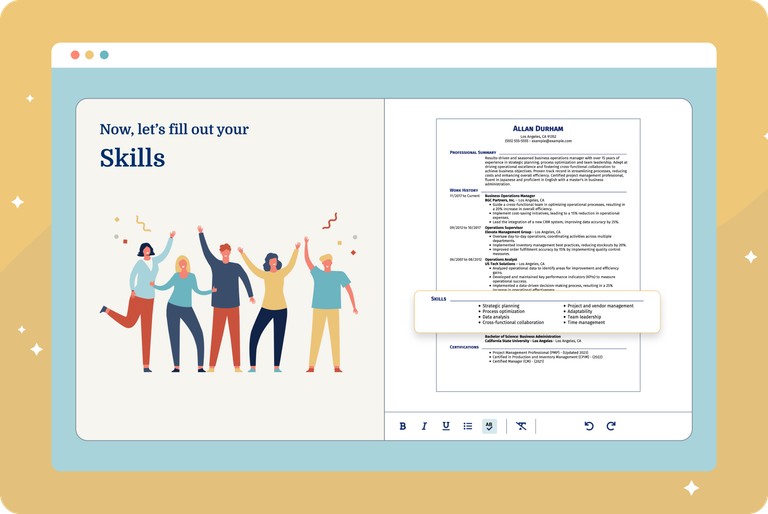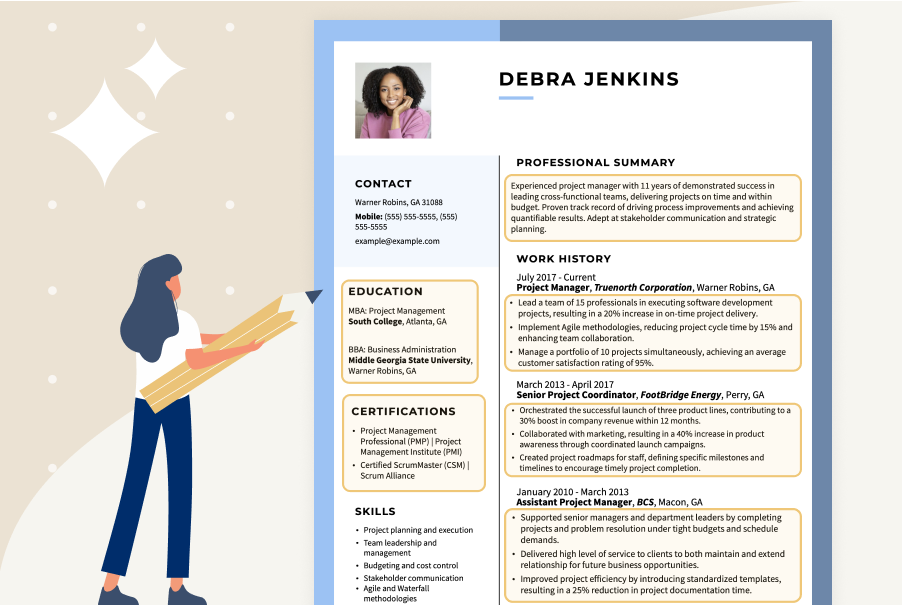What Are Hard Skills? Definition & Examples

Our customers have been hired at: *Foot Note
AI Resume Skills Generator

To perform any job and build a resume, you need a very particular set of skills called hard skills. Hard skills are key to advancing your career and can even help you attract recruiters. But what are hard skills? Why do you need to learn about them?
In this guide, we’ll look at:
- What are hard skills?
- How to list hard skills in a resume and cover letter.
- Tips to add hard skills to your resume and cover letter.
Find, customize, and download a resume template for your job search today.
Craft the perfect resume with our resume builder, designed to help you land your dream job.
What are hard skills?
“Hard skills are the things that you gain through hands-on experience, your training, your education, it's the competencies you need to complete [your job],” says Debra Wheatman, president of Careers Done Write.
Hard skills, often called technical skills, can be learned. You can acquire these skills through education, training like courses and certifications, and on-the-job experience. Hard skills help employers determine if you are able to perform the job.
“On a resume, it's great because you can attach [hard skills] to something specific, like let's say you built a model and you can attach the outcome to that. It’s easier to attach an outcome to hard skills than to soft skills,” says Wheatman.
Top hard skills employers are looking for
- Blockchain
- Cloud computing
- Content creation
- Content management systems
- Copywriting
- Foreign languages
- Data analysis
- Database management
- MS Office
- Machine learning
- Spreadsheet
- System administration
- Project management
- UX design
- Video production
- Web development
Make a resume with MyPerfectResume
Our Resume builder can help you write the perfect resume. Start Now!
Use our AI Resume Skills Generator to get skills suggestions tailored for your desired job role.
Hard skills vs soft skills
Video: Hard Skills vs Soft Skills
How to list hard skills on a resume
When choosing the hard skills to put on your resume, always keep the job description in mind and research the company. Tailoring your resume to the potential employer’s needs will get you noticed. As you are resume writing, you’ll notice skills present throughout the document. Each section will feature hard skills according to your chosen resume template.
- Skills section — This dedicated section should include a list of six to eight soft and hard skills. When tailoring your resume, keep the job description in mind. The description will have the information needed to create an eye-catching skills section. Include every skill you have that they are looking for and use bullet points for an ATS friendly resume. If applicable, include your proficiency or expertise level before or after the skill. For example, Native Spanish Speaker or Mandarin (Intermediate).
- Professional summary or resume objective — This section is your introduction to the hiring manager, it should include one to three hard skills that are most relevant to your target job. Point out something you recently accomplished using a hard skill, such as "Managed an annual budget of more than $1 million for the last two years.”
- Work history — The work history or experience section should include a list of achievements for each position you’ve held. To introduce your hard skills and explain how you successfully used them, use the PAR method, which stands for Problem Action Result. For example, “Analyzed KPIs through Tableau and Salesforce to establish a new successful marketing strategy resulting in a 18% sales increase”.
Hard skills examples by job category
These hard skills examples work for specific industries. “It takes a little bit of time for people to develop these skills, but it’s perfectly doable,” says Wheatman, “You just have to be interested in learning.”
Tech Skills
Technology runs the workplace. Tech skills, like programming languages, artificial intelligence and security, are needed in fields like medicine, business, transportation, logistics and more.
SQL developer, telecommunications project manager, data analytics manager, backup administrator and cloud computing engineer are a few of the roles that benefit from including these skills on their resume.
- C++
- R
- Python
- Java
- SQL
- Cloud computing
- Data structures
- Frameworks
- Network protocols
- Machine learning
- Algorithms
- Database systems
- Version control system
- Management information systems
- Blockchain
- Cybersecurity
Research Skills
Whether you’re learning about your competitors, conducting a large sample survey or completing an academic investigation, research skills are used across industries. Learn, improve and master these skills for roles like: E-commerce QA tester, procurement analyst, billing specialist and PMO analyst.
- Analytical skills
- Data analytics
- Competitive research
- Competitive analysis
- Data processing
- Risk Analysis
- Database management
- Data mining
- UX research
- Data collection
- Interviewing
- Report writing
- Research methodology
- Note-taking
- Resource management
Business skills
Maintain businesses running accurately and efficiently with these skills, great for roles like accounting administrator, payroll analyst, risk analyst and restaurant chain manager.
- QuickBooks
- Budget forecasting
- Asset management
- Financial management
- Audit planning
- Risk management
- SOX
- Process flow
- Cash flow analysis
- ISO 9001 & ANSI Standards
- Supply chain management
- Budget management
- Billing systems
- Human Resources
- Taxation
Sales & Marketing Skills
Working with tools to help market and sell your product and brands is key. These sales and marketing skills can help positions like direct sales representative, brand manager, public affairs specialist and SEO analyst.
- A/B testing
- Project development
- Workflow planning
- Product development
- Search engine optimization (SEO)
- Conversion rate optimization (CRO)
- Market research
- Social media
- Sales channels
- Point of Sales
- Trello
- SEM
- Digital marketing
- Campaign management
- Vendor management
Education skills
Whether you’re working with children and adults, these education skills will help you create and perform classes and courses. Don’t forget about corporate training, extended schools and workshop opportunities to put these skills to use. Other roles that benefit include daycare teacher assistant, after school teacher, early childhood teacher and adjunct professor.
- Curriculum development
- Classroom management systems
- Presentation skills
- Record keeping
- Early childhood development
- Pedagogical content
- Structured and unstructured interactive teaching
- Lesson planning
- Grade-level specific knowledge
- Administrative skills
- Google Suite
- Microsoft Office
- ESL
- Scheduling
- Math
Medical skills
Beyond doctors and nurses, these medical skills can be applied to other roles in the health care industry. Coding specialist, physician assistant, nuclear medicine technologist and medical assistant are a few roles that benefit from these skills.
- Patient assessment
- Patient safety
- Electronic Medical Record (EMR)
- Cardiopulmonary Resuscitation (CPR)
- Medication management
- Wound care
- Telemetry
- Case management
- Advanced Cardiac Life Support (ACLS)
- IV-Line Placement
- Record assessment
- Treatment planning
- Case management
- Specialty care
- Infection control and aseptic procedure
- Equipment maintenance
- Patient referral
Communication skills
Communication is key for every industry. A few aspects, like respect and cultural competence, can be considered soft skills. However, mastering the tools to get your message across to the right audience and knowing how to present your ideas or brands are necessary communication hard skills in every industry.
From business management, customer experience manager, front office assistant,interpreter, community outreachand journalist are all roles that benefit from including communication hard skills.
- Academic writing
- Content management
- Community outreach
- Foreign languages
- Translation
- Writing
- Copy editing
- Editing
- Content creation
- Public speaking
- Video production
- Transcribing
- Grant writing
- Press release
- WordPress
Need to see it in action?
These resume examples show how your resume skills section could look.
Other articles to help showcase your hard skills
Don’t miss these essential articles for more advice on how to land the job you want.
4 Skills Hiring Managers Want In Job Hunters (But Can’t Often Find)
What Skills Have You Acquired From Your Work Experience?
How to Write the Best Elevator Pitch for Any Job (+ Tips and Examples)
Top Ten Behavioral Interview Questions and Answers
Pro tip:
Research conducted by Payscale found that “44 percent of managers feel writing proficiency is the hard skill most lacking among recent college graduates”.
Make a cover letter with MyPerfectResume
Our Cover letter builder can help you write the perfect cover letter. Start Now!
How to learn and improve hard skills
Hard skills are learned through education, training and experience. Depending on your industry and role, you could be required to show your education credentials.
Education refers to formal learning, like:
- Community college
- Higher learning institutions
- Workshops
- Online courses
- Extension schools
- Conferences
On the other hand, training is designed to teach specific skills, like auto mechanics, cosmetology and others. Training takes place in:
- Trade schools
- Apprenticeships
- On-the-job training
You can add more skills to your toolbox through experience. Whether at a formal position or volunteering, your day-to-day tasks and projects will give you a wide range of skills, like basic computer skills and customer service.
Key takeaways
- Hard skills are competencies to perform a job. These abilities can be learned through education, training and on-the-job experience.
- These skills can be improved with more training and experience.
- Despite being touted as industry-specific, many hard skills are transferable among industries, particularly those involving software knowledge.
- A resume can be filled with hard skills and you can highlight them according to their placement.
FAQ
What’s the difference between hard skills and soft skills?
We use hard skills and soft skills to perform at our jobs. Hard skills relate to the nitty gritty of our work: the tools used, the spoken or written languages, the programming, the administrative tasks, the services rendered. Soft skills relate to how we work and interact with others: communication, creativity, teamwork, active listening, cultural competence, empathy. Your resume should reflect a balance between both.
Unlike soft skills, which can be used in any industry, hard skills are not always transferable. While you can use a few across some industries, like Microsoft Excel, a different language or data analytics, hard skills are, for the most part, job-specific.
Are hard skills more important than soft skills?
It will depend on the job, but generally speaking, your resume should show a balanced mix of hard and soft skills. Employers need candidates with the hard skills to perform the job and the soft skills that fit the company culture in the long term. Strive to acquire and improve the hard skills in your desired career while working on bettering your soft skills through life and job experiences. See our skills-based resume guide for additional tips and examples to help you craft your resume.
Are hard skills the same as transferable skills?
No. Transferable skills are soft skills used across industries, no matter how different. While certain hard skills can be transferable, like Google Workspace, coding, marketing and project management, hard skills are mostly job-specific. Hard skills help you perform your job, so even if you bring the knowledge from a different industry, it won’t be used exactly the same.
What are the top 10 hard skills employers look for?
These are the top 10 hard skills employers are looking for. These skills translate to different industries, which can help you advance in your career and change industries more confidently.
- Social media skills
- Project management skills
- Hard communication skills
- Analytical skills
- Sales skills
- Management skills
- Digital marketing
- Customer service
- Finance
- Marketing
- Computer science
How can I highlight my hard skills in a job interview?
Job interviews are about learning more about who you are, what you’ve accomplished, and why hiring you benefits the company.
Use the PAR or STAR technique to answer the questions that require storytelling. PAR stands for Problem Action Results. After explaining the problem, use the action part to include all the hard skills you used to achieve the results.
Employers will ask behavioral interview questions about what tools and skills you have used in previous jobs. This is an opportunity to list the skills you have that the company needs. You can also include other skills that could benefit the company, even if they weren’t mentioned in the job description.
How can I highlight my hard skills in a cover letter?
Writing a cover letter can help your application by helping you expand on the points from your resume and include more information about your career, experience and interest in the company.
Use storytelling in the cover letter’s body paragraph to include important accomplishments. As you narrate how you achieved it, include all the hard skills you used in the process. Use the PAR method to write about an accomplishment. For example, if you’re a personal trainer retelling how you assisted in training an athlete, speak about your accurate assessment skills, how your ACE certification allowed you to prepare an effective training and how your PT Hub knowledge helped you monitor progress.
Our Cover Letter Builder can help you create a cover letter quickly and easily. Our step-by-step and industry specific expert suggestions do the work for you. You can edit the content to your liking, change the template until you’re satisfied and save to return later. Find a cover letter example and get inspired to write your own.
How we reviewed this article
Since 2012, we have helped more than 11 million job seekers. We want to make your career journey accessible and manageable through our services and Career Center’s how-to guides and tips. In our commitment to bring you a transparent process, we present our Editorial Process.
Sources
- Interview. Debra Wheatman, president of Careers Done Write
- Report. The Ladders. Report, Keeping an eye on recruiter behavior.
- CNBC. Article. Perman, Cindy. Including these in-demand skills on your resume could be the key to getting hired
- Investopedia. Blog. Connett, Wendy. Hard Skills: Definition, Examples, and Comparison to Soft Skills
Our customers have been hired at:*Foot Note












